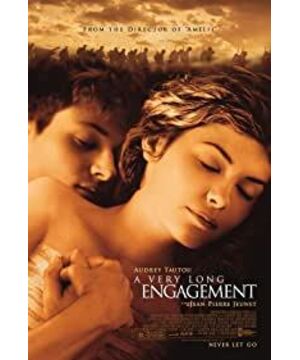In the French countryside before 1914, Matilda, who was crippled with polio at the age of five, ran freely between the boundless wheat waves and the country streets. Looking up, the sky and the earth are golden, Matilda's deer-like eyes reflect the color of the harvest, and the air seems to be the wet salty sea waves and the attractive aroma of farm beer. At this moment, she may recall that it was the same season many years ago, when little Manek wore a hat and fastened his overalls behind her, and looked at her strange steps and asked, "Does it hurt when you walk?"
"Does it hurt when you walk?" The seagulls flying all over the sky around the lighthouse, the child standing at the top of the lighthouse kissing across the window, facing the sea with her back to the tower was extremely content and happy, Matilda would not have thought that Manek The childlike concern resounded in her ears again after a few years, and it would be the last line of defense that collapsed from her tears.
How long is a long marriage contract? Those who see the title of the movie for the first time may take it for granted that this is just a stereotypical plot of a man and a woman who keep their promises or stay together or separate and reunite. Indeed, the protagonist of the film is finally reunited, and the story can hardly be called thrilling. It mainly tells the story of a young French man and woman from the countryside who got engaged and separated due to war during the First World War. The male protagonist was sentenced to death for self-mutilation in the Battle of the Somme and was thrown into the trenches where the two armies faced off. After the war, everyone thought that the male protagonist was dead, but the female protagonist firmly believed that he was still alive by her own feelings and insisted. Find him and finally reunite.
However, director Jean-Pierre Genet tried his best to tell us the length, far beyond the span of time.
What is the meaning of waiting, or, in what state would an ordinary person insist on the belief of waiting? Common sense may tell us that the purpose of waiting is nothing more than the belief that the person or thing we are waiting for exists and will come.
However, when the purpose of waiting is elusive, when everyone sighs, weeps, or ignites the flame of revenge in front of the waiter, when thousands of facts and thousands of signs tell the waiter: let it go and pursue a new life.
At this moment, what kind of courage, perseverance, and forbearance should be paid to wait for a seemingly unrealizable promise to pursue the life hope of a childhood sweetheart who has little hope of fulfillment? Matilda has the answer.
The obsession with life and love constitutes all the reasons for Matilda to wait
"If Manek were dead, Matilda would have known that ever since she was notified of her death, she had stubbornly trusted her instincts, like a flimsy wire, and she had never been discouraged, not to mention that Matilda was naturally optimistic. She thought to herself: If that line can't bring her to her lover, it doesn't matter, she can hang herself at any time."
Matilda's intuition and waiting are far from the desolation and helplessness of "poor and uncertain riverside bones, just like a woman in a spring boudoir's dream". It is the longing for the lover's life and the active and optimistic persistence in love: when he bids farewell to Manek, Manek rides the car to raise the dust away, and the lens in the dust gives Matilda's face close-up, tearful eyes With determination, he lifted his skirt, dragged his lame foot to take a shortcut, ran in the field, and muttered: "If I get to the corner before the car, Manek will come back alive"; "If I count On the seventh day, before the train entered the cave, or before the ticket inspector came, Manek was dead.” …
The albatross in the film is the best footnote of Matilda's obsession with love. Matilda, while blowing the trumpet alone in the house, recalled the time before her departure with Manek. Maniec climbed the bell tower of the church with Matilda on his back. Looking at the albatross flying in the wind, Manek whispered softly to Matilda: "Look, the albatross is very stubborn, it knows that it can overcome the wind." The director endows the albatross with a strong symbolic meaning here. Matilda's persistence and stubbornness are just like the albatross fighting against the wind and waves, stubborn and beautiful.
When Manek rang the church bells one after another, and engraved MMM (Magnec marries Matilda/Matilda marries Manek), the camera showed three passers-by's face close-ups with their heads raised and pious expressions, Finally, an elevation shot of the distant view of the church bell tower. In the bell, the love between Matilda and Manek is endowed with celestial dignity.
In every self-expectation, in every fulfillment or unfulfillment of expectation, to firm up an inexact result can be called a long period of time. In the process of searching, the thickness of the stories entered can be described as long.
The film is not based on the single-line narrative of Matilda's search for her fiancé, but takes the process of Matilda's search as the main line, and draws out the story of the comrade-in-arms who suffered with Manek as a branch line. These stories go hand in hand. Because of Matilda's perseverance and search, she was led out one by one.
Of these sidelines, the one that impressed me the most was the story of another waiter, the prostitute Tina Lombardi.
Tina Lombardi's lover, named Angie, was thrown into Twilight Bingo along with Manek to die. Marshal Pétain's pardon was issued to the front line, but was torn apart like a game by the faint-hearted general and thrown into the bath. Qi was shot and killed by his own frontline commander at the moment when he surrendered to the German army, desperate for survival in the trenches of the two armies.
After the war, Tina Lombardi knew all of this, and took revenge at all costs, killing all the military figures related to the killing of An Qi, and turning into a prostitute to get close to them. The scene of assassinating the general can be called a classic.
The camera is first given to the record player, and the record is spinning rapidly on it. The music on the record player is fast, dark, and a little depressed, mixed with the excited voice of the general. When the camera is aimed at the two people on the bed, the soprano's voice sounded, and the pitch fluctuated slightly strangely. Although the furnishings in the bedroom in the shot were luxurious, the lighting was dim. When they look at each other from their respective perspectives, their faces are half-light and half-dark, suggesting the difference between the two and the conspiracy of Tina Lombardi's heart. Then she got out of bed and pulled out the gun, the music suddenly changed, the female voice disappeared, and turned to a more rapid variation. When she was about to shoot, the soprano appeared again, this time more high-pitched, gradually increased, and then increased until the maximum. Accompanied by the close-up of the general's terrified eyes, there was a crisp gunshot, followed by the sound of the glass of the chandelier breaking, and then the sound of glass piercing the general's body like a sharp blade. After the general's terrified eyes, it was Tina Lombardi who took revenge. The happy, gloomy eyes gradually disappeared into the black - at this time, Tina Lombardi was like a vengeful devil from hell.
But everything this devil does is for her angel.
Tina Lombardi was finally executed for murder. Matilda found her before her execution and gave her the relic that Angel had left Tina Lombardi with her search - a pocket watch, Tina The moment Lombardi opened the pocket watch was heart-wrenching, and she found the note Angie had hidden inside:
"Vengeance is pointless, don't ruin your life for me - your hell angel Angie."
Tina Lombardi burst into tears.
Life, death, and love are eternal themes, and this film covers all three. War is naturally about life and death, and love is beyond life and death behind war. Angie's death made Tina lose the meaning of life. Under the belief that death is the ultimate destination, in order to see her angel, the beautiful Corsican, the warm and brave Tina Lombardi transformed into A vengeful devil. When the lover's belated consolation arrived in his hands, the tears in his tears should no longer be regret, but joy: "I don't regret it, and I'm not afraid, except for my hair, which will be cut short before execution. Will go to see my Angel like Joan of Arc"
What kind of anti-war expression is clever? This question is worth pondering. However, it is obvious that the more you explore from a small incision and perspective, the more you can touch people's hearts. The cruelty of war does not lie in facing the wilderness of thousands of troops and horses and corpses, and seeing death as a result for the cause or doctrine, but in the fragile, pitiful and weak individuals who once enjoyed the warmth of the world before the war. The face of war is like a scrap of paper swept into a machine that destroys everything. Whether or not this individual survived after the war is no longer important. What is important is that he was crushed into a piece of white paper from a living, thick person, and has since lost its color.
Manek is such an individual.
A handsome, kind farm boy who falls in love with a lame childhood sweetheart girl. When they meet for the first time, they will ask with concern: "Do you feel pain when you walk?". When I was young, I would carry my partner to climb the tall lighthouse. In the film, the bird's-eye view camera revolved rapidly around the lighthouse and then gradually moved away. The words of childlike jokes seemed sacred and soul-stirring in front of the sea. When he was an adult, he would carry his girlfriend on his back and look at the sea and albatrosses in the church, he would carve oaths on the coast and on the clock face, he liked to put his hand on Matilda's chest when he slept, and when he raised his hand, he could listen. to her heartbeat like morse code...
Everything disappeared with the outbreak of the war.
In the face of the death machine, no matter how handsome a young man is, he is just a useless part dedicated to it. Manek was devastated by the war to the point of losing his mind. The film focuses on describing the process of Manek's collapse.
Manek, who was charging on the battlefield, fell into the crater to avoid the artillery fire. Another comrade-in-arms was blown to pieces by the bomb in front of him before he could dodge in. The director used a very realistic method here: after the dust dissipated , the battlefield is silent, the camera is aimed at Manek from a low angle: Manek's mouth and nose are full of blood and minced meat, and then zoomed out from a bird's-eye view: the crater where Manek is hiding is full of bloody corpses. Ke's face gradually showed a look of extreme horror, his limbs swayed helplessly, and finally let out a long howl of despair. Since then, he has collapsed and became a lunatic.
In order to avoid the war and return to his hometown to see Matilda as soon as possible, Manek chose to self-mutilate, and his hand stretched out on the front line was pierced by enemy snipers. Unexpectedly, the commander saw him. The military court sentenced him to death. Before throwing into the bingo trenches at dusk, this clip took my heart away for a long time:
A comrade in arms asked Manek, "Where is your fiancée?" Another comrade added kindly, "Matilda, her name is Matilda." It started a muttering that was more of a monologue than a dialogue. "Matilda", through this 5-second close-up, it can be seen that after gently repeating his lover's name, the corners of Manek's mouth twitched slightly, his facial expression softened, and his eyes seemed to be filled with light , from being dazed to being spirited, like being suddenly awakened from a deep slumber, followed by an unusually soft tone, which seems to be whispering to a lover, but on the occasion, it makes people feel grotesque.
Until the end of this passage, Manek said something astonishing: "Fortunately, we don't have to wait until the war is over. After the execution, I can go home immediately." With the close-up, the horse at this time Nek still had a smile on his face, but it felt cold and cruel, and his eyes looked sloppy. A normal person would not say such words seriously with a smile under normal circumstances. Here, the director actually told us with subtext (subtext): the war has completely destroyed the mind of this young man. From another point of view, these words came from the mouth of a madman, and in such a strange tone, in fact, the director has a symbol here, the biggest absurdity is the most real reality, one was destroyed by war. The person who is about to die has no hope of life in theory, so he can only hope that he will be reunited with his fiancee in this way. And at this moment, these words are precisely the words of a madman who is on the verge of collapse. Because what he said is so precise and religious, it deepens a layer of irony.
The use of juxtaposed cameras is also a highlight of this clip to enhance the sound art. It can be seen that although this clip is similar to a monologue by Manek, the camera will give expressions to the surrounding comrades after every word of Manek. A close-up of three such shots. As Manek's words became more and more bizarre, the expressions of his comrades also changed accordingly, appearing more and more astonished. Chocolate eats his bread, creating a stark contrast that makes the director's irony even stronger.
Here, several close-ups of the comrades in arms are actually the use of juxtaposed lenses, showing the effect of the Manek language. The mood of the comrades in arms is a reflection of normal people, just like the audience, after hearing this sentence , unavoidably heavy and heartbroken, and complemented by an ode-like mournful murmur of background music throughout the discourse, the film's themes are brought out strongly here:
War destroys people and destroys hope, but it cannot destroy love. Even if those who are in love experience incompleteness and despair, the day of reunion will eventually come, and the light of suffering will not be covered by darkness.
But as mentioned before, the use and pursuit of "incompleteness" seems to be the consistent style of director Jean-Pierre Genet. Manac and Matilda finally reunited, but they are no longer Whole, wholesome person. Matilda lost a leg to polio, while Manek lost her memory from the trauma of the war. The ending of the lovers who were reunited as childhood sweethearts does not seem to be happy on this level, but from another perspective, it is also more real and moving. Hope has always been accompanied by despair, and consummation is just a deformed abnormality. Tilda's love becomes more sacred and precious only in the mutilation and suffering. Memory loss is the best possible ending for a war-torn teenager.
The use of color is also the genius of the director Jean-Pierre Genet in this film. The title cuts directly to the war scene, and the dim and pale background color runs through the war scene from beginning to end, with the continuous rain. The shattered cross and the image of Jesus face the oppressive and dull breath, which is suffocating.
And when the plot evolves to Matilda's current stage and recalls the past, it is full of golden hues, the pale yellow sky, the golden wheat fields, and the soft sunlight hits the ends of Matilda and Manek's hair. Gold glowing on top. Such techniques are also commonly used in some classic films, such as "The Dawns Here Are Quiet" and "Life is Beautiful". Enjoy, the colors are bright and mellow, giving the film a texture of oil painting and a romantic background.
This background color finally continues to the end of the film:
Matilda walks through the dark porch to the garden where Manek is located. When passing through the porch, the sound performance of the film is very low-key, so quiet that only Matilda's footsteps and the birdsong in the garden can be heard. , Matilda stopped when she came to the door, the noisy garden in front, and the silent and dark promenade in the back, which actually symbolized the depression and loneliness that Matilda had endured in the process of searching for a long time, while the bright light ahead And the noise symbolizes the hope of life and the hope of love.
When Matilda was about to walk out of the porch, the theme song sounded again. As Matilda gradually moved towards Manac, the tune was soothing and the rhythm was calm, as if it were about to explode but always suppressed, just as Matilda was in During this process, he always watched Manek with tears in his eyes but never said a word.
Why do you cry?
Manek asked her, "Aren't you tired when you walk?" She responded by nodding and shaking her head. The tears in her eyes, like background music, seemed to pour out at any time, and the emotional depth of the film gradually accumulated and strengthened. Finally, when Manek asked, "Why are you crying?"
Matilda's tears finally burst out with the music, she still did not speak, but the tone of the music suddenly intensified, and her emotions were vented like a storm, and she had already answered for Matilda:
"You said why I cried, you have amnesia and don't remember anything, but who knows how much I have traveled, how much suffering, and how much heartbreak I have endured to find you?"
However, Matilda said nothing:
"Matilda leaned back in the chair,
Put your hands on your knees and look at him
in the garden light
in the sweet air
Matilda looked at him, she looked at him. "
The original text is contained in the WeChat personal public account: Heathcliff's writing desk, welcome to pay attention.
View more about A Very Long Engagement reviews











